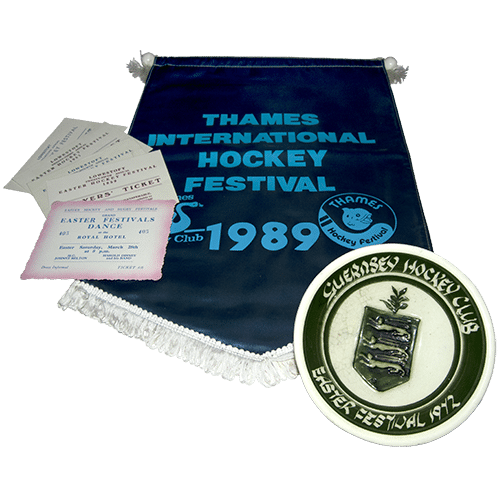Researching Hockey
Following our founding as the world’s only museum for hockey, historical objects and archives began to be brought together in sufficient quantity to enable research into the history and development of our sport.
So much amazing history has been uncovered, but there is so much more still to discover and learn about.
Our Research and Your Research
We are keen to encourage people to visit and use our library, archives and collections as a basis of their research. This might be developing a family genealogy, writing a club history or undertaking a piece of academic work.
Several of our volunteers undertake fascinating research projects of their own. Some of these areas of research are outlined below. If you are interested in volunteering with us to research a certain aspect of hockey’s history, please get in touch. It could be one of the topics below or another area of interest entirely.
We also operate a public enquiries service where our staff and volunteers will undertake research for you using our collections and archives (ideally in exchange for a donation to the Museum).
We are a charity receiving no government aid. Please support our current and future research and storytelling work by making a donation today.

![Stats research [crop 2]](https://museum.ceelect-test.co.uk/wp-content/uploads/2023/06/Stats-research-crop-2.jpg)

Evolution of the Game
Hockey has an extensive family tree that makes for a rich genealogy for the sport. Our principle focus is the origins of ‘modern’ hockey in Britain that spread globally, but we also cover indigenous stick and ball games from around the world as well as hockey’s modern variants including mixed hockey, indoor hockey and masters hockey.
Changes to the modern game are captured in rule books and minutes. We research how the rules of hockey differed between men and women, how the game evolved over time and which rule changes were the most impactful.

Amateurism vs Professionalism
Traditionally, English hockey’s governing bodies favoured a strictly amateur spirit. They banned competition and clubs were forced out if they played in leagues or cups. Hockey in Victorian England was traditionally played during weekday leisure time by the wealthy, but this wasn’t always so. THM is researching areas of hockey which deviated: rival northern associations that championed league hockey, works clubs that played at weekends, and the formation of the National League in the 1970s.
Match and Player Statistics
Our stats working group researches and collates definitive records for English and British hockey. Match and player data for Great Britain (GB) international hockey is complete and work is underway for England men and women, for umpires, the National League, and junior international hockey.
Our definitive GB data created unique legacy numbers for GB athletes (like in rugby and cricket) which was celebrated by the awarding of honours caps for the first time.

Associations: National and International
Our volunteers research the early years of the English men and women’s hockey associations and their development using our archives. We hold the first records of the International Hockey Federation (in French) chronicling the early administration of world hockey.
Our partner, the University of Bath Library, makes available archives for the women’s international association and the All England Women’s Hockey Association (AEWHA).


Hockey Festivals
For more than a century, hockey festivals have been one of the most important events in the hockey calendar. Usually held at the end of the season around Easter and comprising club, touring and even international teams, festivals demonstrate the celebrated social side of the ‘amateur’ game. THM is seeking to compile a list of all English festivals as well as researching stories of ‘festival going’ to complement the memorabilia held in the collection.

The Influence of PE Colleges
Formal training for female physical education (PE) teachers became a reality when Madame Bergman Österberg’s Physical Training College was founded in Hampstead, London in 1885. Its pioneering approach inspired the creation of other specialist PE colleges and generations of teachers and hockey players. THM is investigating the influence of these former students on the development of women’s hockey, not only in England and the other Home Countries, but internationally.
Asian Diaspora Hockey
The British Raj and British Empire interests in East Africa have had a lasting impact on hockey internationally and within modern Britain. Hockey equipment is manufactured in India and Pakistan and their national teams have long been dominant forces in the men’s global game.
THM has strong connections with experts researching South Asian diaspora hockey including Sikh hockey and early hockey in British India.

Hockey’s Military Stories
Hockey has a long military history. Historically, the British Royal Navy, Army and Royal Air Force all fielded elite teams that competed against regional hockey squads. Hockey was also used in the services for fitness and recreation. This project aims to shine a light on feats of bravery by hockey personnel during conflict situations across the 20th century and beyond.


The People behind the Game
We work to chronicle the lives of hockey people who made a difference across all levels of the game: from grassroots heroes to the elite talent of yesteryear; inspirational players, umpires, coaches, administrators, teachers and pioneers such as the women who founded PE colleges creating some of the first talent pathways.

Women’s Hockey at Wembley Stadium
The history of England women’s annual international hockey matches at Wembley Stadium (1951-1991). Spectacular games, iconic players and huge crowds of screaming schoolgirls; the golden era for women’s hockey in England. Now available as a book from THM shop.
You might also like
Continue to explore hockey’s fascinating history and heritage across other areas of our website.

Our Collections

Hockey Stories

